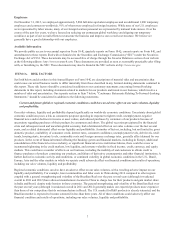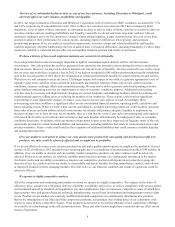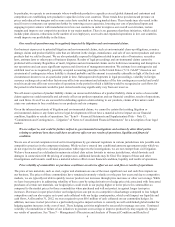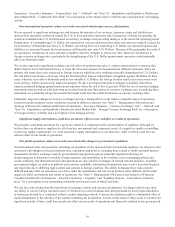Tecumseh Products 2012 Annual Report Download - page 18
Download and view the complete annual report
Please find page 18 of the 2012 Tecumseh Products annual report below. You can navigate through the pages in the report by either clicking on the pages listed below, or by using the keyword search tool below to find specific information within the annual report.17
ITEM 7. MANAGEMENT’S DISCUSSION AND ANALYSIS OF FINANCIAL CONDITION AND
RESULTS OF OPERATIONS
Cautionary Statements Relating To Forward-Looking Statements
The following information should be read in connection with the information contained in the Consolidated Financial
Statements and Notes to Consolidated Financial Statements in Item 8 of this report.
This report contains forward-looking statements within the meaning of the Private Securities Litigation Reform Act that are
subject to the safe harbor provisions created by that Act. In addition, forward-looking statements may be made orally in the
future by or on behalf of us. Forward-looking statements can be identified by the use of terms such as “expects,” “should,”
“may,” “believes,” “anticipates,” “will,” and other future tense and forward-looking terminology, or by the fact that they appear
under the caption “Outlook.” Our forward-looking statements generally relate to our future performance, including our
anticipated operating results and liquidity sources and requirements, our business strategies and goals, and the effect of laws,
rules, regulations, new accounting pronouncements and outstanding litigation, on our business, operating results, and financial
condition.
Readers are cautioned that actual results may differ materially from those projected as a result of certain risks and uncertainties,
including, but not limited to, i) current and future global or regional economic conditions, including housing starts, and the
condition of credit markets, which may magnify other risk factors; ii) loss of, or substantial decline in sales to, any of our key
customers; iii) our history of losses and our ability to maintain adequate liquidity in total and within each foreign operation; iv)
our ability to restructure or reduce our costs and increase productivity and quality and develop successful new products in a
timely manner; v) actions of competitors in highly competitive markets with intense competition; vi) the ultimate cost of
defending and resolving legal and environmental matters, including any liabilities resulting from the regulatory antitrust
investigations commenced by the United States Department of Justice Antitrust Division and the Secretariat of Economic Law
of the Ministry of Justice of Brazil, both of which could preclude commercialization of products or adversely affect
profitability and/or civil litigation related to such investigations; vii) availability and volatility in the cost of materials,
particularly commodities, including steel and copper, whose cost can be subject to significant variation; viii) financial market
changes, including fluctuations in foreign currency exchange rates and interest rates; ix) default on covenants of financing
arrangements and the availability and terms of future financing arrangements; x) reduction or elimination of credit insurance;
xi) significant supply interruptions or cost increases; xii) potential political and economic adversities that could adversely affect
anticipated sales and production in Brazil; xi) potential political and economic adversities that could adversely affect
anticipated sales and production in India, including potential military conflict with neighboring countries; xiii) local
governmental, environmental, trade and energy regulations; xiv) increased or unexpected warranty claims; xv) the extent of any
business disruption caused by work stoppages initiated by organized labor unions; xvi) the extent of any business disruption
that may result from the restructuring and realignment of our manufacturing operations and personnel or system
implementations, the ultimate cost of those initiatives and the amount of savings actually realized; xvii) the success of our
ongoing effort to bring costs in line with projected production levels and product mix; xviii) weather conditions affecting
demand for replacement products; xix) the effect of terrorist activity and armed conflict. These forward-looking statements are
made only as of the date of this report, and we undertake no obligation to update or revise the forward-looking statements,
whether as a result of new information, future events or otherwise.
For more information regarding these and other uncertainties and factors that could cause our actual results to differ materially
from what we have anticipated in our forward-looking statements or otherwise could materially adversely affect our business,
financial condition, or operating results, see “Risk Factors” in Item 1A of this report.
EXECUTIVE SUMMARY
In addition to the relative competitiveness of our products, our business is significantly influenced by several specific economic
factors: the strength of the overall global economy, which can have a significant impact on our sales; our product costs,
especially the price of copper, steel and aluminum; and the relative value compared to the U.S. Dollar of those foreign
currencies of countries where we operate.
Economy
Our sales depend significantly on worldwide economic conditions and the demand for the products in which our products are
used. Global economic weakness and uncertainty, including the ongoing challenges in the U.S. and the debt crisis in certain
countries in the European Union, continue to impact our sales. Sales decreased in 2012 compared to 2011 primarily due to the
unfavorable impact of changes in currency exchange rates, partially offset by net higher volumes and favorable changes in mix
and net price increases. Excluding the effects of foreign currency translation, sales in 2012 were approximately 6.2% higher
than in 2011.
























